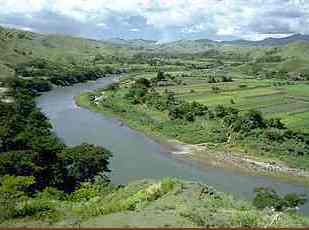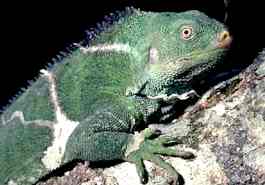|
FIJI 7th Port of Call - SUNSHINE ROUTE
|
||||||||||||||||||||||||||||||||||||||||||||||||||||||||||||||||||||||||||||||||||||||||||||||||||||||||||||||||||||||||||||||||||||||||||||||||||||
|
Fiji has over 300 islands in its archipelago, each fringed with coral reefs and lapped by warm azure waters - the diving and snorkelling are superb. Amid its wealth of natural beauty, Fiji's true magic lies in its people and the fascinating blend of their diverse cultures. Fiji is an interesting blend of Melanesian, Polynesian, Micronesian, Indian, Chinese and European influences. For nearly 50 years, until the military coup of 1987, the indigenous people of Fiji represented an ethnic minority in their own land.
Fiji archipelago
The vast majority of Fiji's land mass is volcanic in origin, with some reef-formed limestone and coastal sedimentary formations. The major islands are generally mountainous in the interiors which creates a rain shadow effect. The western sides of Viti Levu and Vanua Levu are drier and less thickly vegetated than the eastern areas. The difference in the rainfall between the two sides is striking. The eastern side of Viti Levu, where the capital city of Suva is located, averages 300 cm in precipitation whereas in the western side where Nadi International Airport is found, averages about 165 cm. Thus on any given day, your chances of getting wet are much greater on any of the larger islands' eastern sides, rather than in the west. Plan your vacations accordingly.
Fiji was the trade centre for the South Pacific during the 19th century. The British claimed it as a colony in 1874. During the century or so that Fiji remained under British colonial rule, tens of thousands of indentured Indian labourers were imported to work on sugar plantations. Despite this indigenous Fijians managed to hold onto their traditions - meke (narrative dance), bure (house) construction, kava ceremonies, tapa-cloth making and pottery.
Among Fiji's 20 species of reptiles, one of the most noteworthy is the crested iguana, brachylophus vitiensis, a species discovered less than 20 years ago on a tiny island off the coast of Vanua Levu (Fiji's second largest island). It is assumed that the original home of the iguana was South and Central America. The species' discoverer, John Gibbons, speculated the iguanas may have drifted from the Americas on large pieces of floating vegetation and ended up in Fiji. Both species of iguanas have been successfully bred at Orchid Island, a tourist attraction near Suva that among other things has many different exhibits of local flora and fauna on display.
Fiji - Vitile Vu
In general, a great deal of Fiji's territory has not been overly developed or severely exploited. Its varied terrain provides a variety of habitats for flora and fauna. These include lowland and montane rainforest, mangroves and swamps, mixed grasslands and inland waters. The ocean environment includes coral reefs, lagoons and deep pelagic areas all of which team with fish. Fiji's reputation as a world-class dive destination is well deserved. In Fiji's rich reef system one may find a multitude variety of marine life all within a few square meters.
A variety of plants and animals occupy the terrestrial areas including birds, reptiles and amphibians. Fiji's flora and fauna is not so diverse as the South Pacific islands that lie closer to the Asian landmass such as the Solomon Islands but not as poor as that of islands further to the east such as French Polynesia.
Some of the reef areas and lagoons of the more populated islands have also been drastically altered. Over fishing, run-off from pollution and sewage from urban areas have lowered fish populations and injured natural habitats in and around the capital of Suva as well as Nadi and Lautoka areas of Viti Levu. Fortunately, much of the aqueous environments on the outer islands are pristine or at least relatively healthy.
The largest island, Viti Levu (pronounced Vee-tee Lay-vu) is home to 70% of the population (about 580,000) and is the hub of the entire archipelago. It measures 146 kilometers long and 106 kilometers wide and has an area of 10,389 square kilometers. In the realm of Pacific islands, it is exceeded in size only by New Caledonia and the Big Island of Hawaii.
There is hope that Fiji's natural heritage will remain intact. As eco- tourism becomes more popular some lands are set aside for hiking, camping, bird watching and other recreational activities. Many of these schemes are funded by grants from the New Zealand government which should be commended for its efforts at preserving Fiji's natural heritage. The National Trust of Fiji is also making inroads in conservation activities.
Full
country name:
Republic of Fiji GDP:
US$4.3 billion
Rare Crested Iguana
LINKS:
Flights Pacific Link Reservations Air Pass Destinations Your Interests Charters Corporate Contacts Backpacker | Diving Resorts | Budget | Moderately Priced | Upscale | Honeymoons
Solar Cola drinkers care about planet earth
.. Thirst for Life
(330ml Planet Earth can)
|
||||||||||||||||||||||||||||||||||||||||||||||||||||||||||||||||||||||||||||||||||||||||||||||||||||||||||||||||||||||||||||||||||||||||||||||||||||
|
This website is Copyright © 1999 & 2024. The bird logo and name Solar Navigator are trademarks. All rights reserved. All other trademarks are hereby acknowledged. Max Energy Limited is an educational charity.
|




